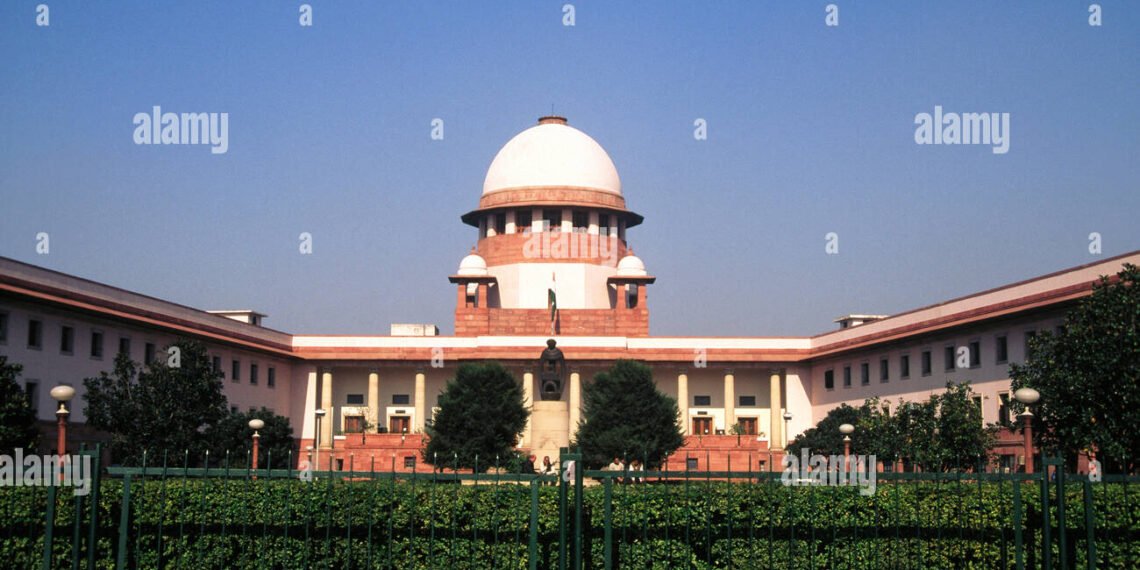Senior advocates Kapil Sibal and Abhishek Manu Singhvi accused the Election Commission of targeting the poor, women, and marginalised groups in a flawed voter verification drive.
BY PC Bureau
New Delhi | August 12, 2025 — The Supreme Court on Tuesday signalled that it could strike down the Election Commission of India’s (ECI) ongoing overhaul of Bihar’s voter rolls if allegations of mass illegal deletions are proven, in what could become one of the most consequential election-related rulings in recent years.
A bench of Justices Surya Kant and Joymalya Bagchi was hearing multiple petitions challenging the ECI’s Special Intensive Revision (SIR) of electoral rolls in Bihar. Petitioners allege the process has resulted in the arbitrary exclusion of around 65 lakh voters from the draft rolls published on August 1, just months before the general election.
Petitioners: Arbitrary, Discriminatory, and Poorly Designed
Senior advocate Kapil Sibal, representing one of the petitioners, argued that the ECI’s prescribed list of 11 “acceptable” identity documents for voter verification is impractical in Bihar’s socio-economic context.
“Most Biharis do not possess these documents. Commonly held IDs like Aadhaar, ration cards, or the EPIC voter card itself are not being accepted for verification. As a result, lakhs of long-standing voters — especially the poor and marginalised — have been rendered ineligible,” Sibal told the bench.
Senior advocate Abhishek Manu Singhvi contended that the SIR is not a routine update but a citizenship verification exercise masquerading as a roll revision. “This is being done just months before elections, which raises questions about motive and fairness,” Singhvi argued, warning of widespread disenfranchisement.
Activist Yogendra Yadav, also part of the challenge, described the exercise as “mass disenfranchisement by design”, pointing to data suggesting women voters have been disproportionately affected by deletions.
ECI: Claims Are Speculative, Exercise is Lawful
Appearing for the ECI, senior advocate Rakesh Dwivedi rejected allegations of bias or illegality. He said the exercise was targeted only at deceased voters and those who have permanently migrated, adding that political parties’ booth-level agents were provided the names of voters excluded from the rolls for scrutiny.
“The allegations being made are speculative and not backed by evidence. This is a lawful exercise meant to ensure the integrity of the voter list,” Dwivedi told the court.
SC Observations: Inclusion Over Exclusion
Justice Surya Kant observed that if the Court finds evidence of mass illegal deletions, it could strike down the entire process.
“The objective should be en masse inclusion, not exclusion. If the allegations are correct, we will not hesitate to quash the entire exercise,” Justice Kant remarked, adding that the Court would not allow the rights of citizens to be curtailed through procedural overreach.
Psephologist Yogendra Yadav on Aug 12 brought to the Supreme Court two people who have been declared dead in the Special Intensive Revision (SIR) of Bihar’s electoral roll.
He told the Court that the names of the two people do not appear in the electoral rolls because they have… pic.twitter.com/8hOM1dBq47
— Bar and Bench (@barandbench) August 12, 2025
The bench also questioned the ECI on why commonly used IDs like Aadhaar were being excluded from the verification process, given their widespread acceptance in other official transactions.
READ: From Kedarnath to Dharali 2025: Why Uttarakhand Never Learns
If the Court intervenes, it could force the ECI to reinstate millions of voters before the elections, potentially impacting the political arithmetic in Bihar, a state with 40 Lok Sabha seats and historically high voter participation.
Political parties across the spectrum are closely watching the case. While opposition groups have openly accused the ECI of deliberately disenfranchising poor and opposition-leaning voters, the ruling BJP has largely refrained from public comment.
SHOCKING 🚨
During the Supreme Court hearing on SIR, people from Bihar came forward — they’re alive, but marked as dead and deleted from the voter list!
After SIR, 65 lakh names removed
ECI says – “Won’t reveal the names, won’t reveal the reason”Is this transparency or the… pic.twitter.com/vomwvTFvDK
— Amar Singh Chouhan (@amar_4inc) August 12, 2025
The hearing will resume on Wednesday, with the Court expected to press the ECI for detailed data on the scale, process, and safeguards of the revision.
If the petitioners succeed, this case could set a major precedent for judicial oversight of electoral roll management in India.
Sibal & Singhvi’s Crucial Arguments in Bihar SIR Challenge
- Kapil Sibal’s Arguments
- Mass Exclusions Without Due Process
Sibal highlighted that approximately 65 lakh voters were omitted from the draft electoral rolls published on August 1 without any prior objection or inquiry, calling this process illegal. - Citizenship Burden Unfairly Shifted to Voters
He argued that the Election Commission (ECI) is placing the onus of proving citizenship on citizens themselves—many of whom lack the 11 required documents such as passports or birth certificates. Widely held identification like Aadhaar, ration cards, and EPIC were reportedly rejected by ground officials. - No Survey Conducted to Substantiate Exclusions
Sibal pointed out that although ECI data shows that 7.24 crore voters submitted forms, the Commission admitted to having no survey to substantiate why 65 lakh were excluded—raising red flags about the process’ reliability - Actual Errors—Alive Voters Marked Deceased
He flagged instances where living voters were mistakenly marked as dead and vice versa—errors he called “not fair” and indicative of systemic flaws - Court’s Oversight Called for—Inclusion, Not Exclusion
The Court asked whether this revision could be struck down if found illegal. Justice Surya Kant emphasized: “The objective should be en masse inclusion.”
READ: SC Halts Action Against Old Diesel, Petrol Vehicles in Delhi-NCR
- Abhishek Manu Singhvi’s Arguments
- ECI Has No Authority to Determine Citizenship
Singhvi asserted that citizenship verification lies with the Union government, not the ECI. He criticised the assumption that 5 crore voters in post-2003 rolls are presumed non-citizens unless they prove otherwise. - Re-Litigating Citizenship Rights for Long-Time Voters
He highlighted the injustice of requiring documentation from individuals—or their descendants—who have been voting for decades, risking disenfranchisement just months before elections. - Court’s Earlier Direction Was a Step Forward
Singhvi noted that during earlier hearings, the Supreme Court had suggested including Aadhaar, EPIC, and ration cards in the verification process—an advance toward fairness.
Complementary Petitioner Positions
- Prashant Bhushan (ADR) pointed out that the ECI did not publish a list of excluded voters nor provide reasons for deletions. Instead, such information was allegedly shared only with political-party agents.
- Yogendra Yadav (Civil Society Activist) framed the SIR as “mass disenfranchisement by design,” warning of manipulation affecting vulnerable groups like women and migrants.
ECI and Supreme Court Position
- ECI’s Defense
ECI maintained that the SIR is a lawful exercise under Article 324 and Section 21(3) of the Representation of People Act, aimed at cleaning up outdated rolls. It defended minor technical errors as “inevitable” in a large exercise and said all excluded voters would receive notices and have a chance to respond. - Supreme Court’s View
The bench agreed that Aadhaar and EPIC cannot be considered conclusive proof of citizenship but must be verified; Justice Kant emphasized that if the ECI lacks the power for such verification, “everything ends.” Acknowledging a trust deficit, the Court stressed it could strike down the process if deemed illegal.
Summary Table: Key Arguments
| Advocate | Core Argument |
| Kapil Sibal | Illegal exclusion of 65L voters; rejection of common IDs; process prone to error |
| Abhishek Singhvi | ECI lacks citizenship authority; unfair burden on long-term voters; prior direction supports inclusion of Aadhaar/EPIC |
| Prashant Bhushan | Lack of transparency; no public list of omitted voters |
| Yogendra Yadav | Systemic disenfranchisement with gender and socio-economic bias |
| ECI | Legal framework supports SIR; small errors correctable; due process assured |
| Supreme Court | Aadhaar/EPIC must be verified; may strike down process if illegal |
As hearings continue, the Supreme Court’s decision could have vast consequences—requiring the ECI to reinstate millions of excluded voters or even quash the entire SIR exercise if procedural illegality is established.
Let me know if you’d also like a visual timeline, side-by-side comparison, or sidebar explainer on Sibal’s and Singhvi’s arguments for added clarity or publication use.














